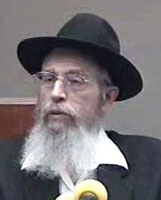- Torah Portion and Tanach
- Bechukotai
The Torah study is dedicatedin the memory of
R' Yosef ben Yaakov
3112
Our parasha contains two elements that are not in Kri’at Shema, both related to security. The Land will not see war, and animals will not ravage. Tannaim dispute the situation regarding the animals. Some say those animals will not be present in our Land at that time. R. Shimon (Bar Yochai) posits that the promise’s greatness lies in that dangerous beasts will be present but will behave peacefully. Why are these elements not found in Kri’at Shema?
To understand we need to see another related machloket, involving R. Shimon. R. Yishmael explains the blessing, ve’asafta deganecha (you will gather your grains), as it sounds, that the blessed will have much harvesting to do from his plentiful crop. R. Shimon says that this is not such a special blessing, as spending so much time in the field takes away from Torah study. Rather, he says, when Bnei Yisrael follow Hashem’s Will, the work of the righteous is done by others (Berachot 35b). Ve’asafta deganecha, says R. Shimon, refers to a time when Bnei Yisrael do not fulfill the Divine Will. Tosafot (ad loc.) ask how it is possible that the section that starts, "if you listen to My commandments," is talking about those who act improperly. They answer that there are different levels. Kri’at Shema is talking about tzaddikim, but not full tzaddikim. The Maharsha finds a hint for that contention. Whereas the first parasha of Kri’at Shema talks about those who love Hashem with all of their hearts, souls, and wherewithal, the second parasha leaves out wherewithal.
R. Meir Simcha explains that R. Shimon Bar Yochai has a consistent approach in both contexts. As his life demonstrates, he felt that entering a cave if need be and living a life cut off from a normal, physical existence is an ideal. One who reaches such a high, unnatural level does not have to worry about normal things like earning a livelihood or fearing vicious animals; he works on a different plane. However, concludes the gemara, the masses who tried to adopt R. Shimon’s approach were unsuccessful.
Every generation has unique individuals who are able to succeed in a life almost devoid of physicality and normal, prudent steps in life. Normal people do mitzvot regularly, find time for Torah study, but also find time to earn a living. As for dealing with animals, a standard society has to develop the world so that there are places set aside for human inhabitation and other areas where animals can roam wild.

"The Land which ..the eyes of the Lord your God are always upon her"
Rabbi Shmuel Eliyahu | Iyar 18 5782

Large Families - The Jewish Ideal
Rabbi Baruch Finkelstein | 24 Iyar 5772

Why Bad Things Happen To Good People
Rabbi Yaakov Asher Sinclair | Iyar 26 5781

What Does The Land Want?
Parashat Bechukotai
Rabbi Yossef Carmel | 19 Iyar 5765

A Jewish Approach to Discipline in the Classroom
Rabbi David Samson | Iyar 5761

Mourning Customs During the Omer
Rabbi Eliezer Melamed | 5764

Reciting Aleinu Along with the Tzibbur
Rabbi Daniel Mann | Tevet 23 5776

Fasting on the Wedding Day
Rabbi Yirmiyohu Kaganoff | Sivan 9 5779

The Solution to 'Risky' Intellectual Topics
Ayn Aya, Shabbat v, 72
Rabbi Ari Shvat | Nisan 5785
Daf Yomi Makkot Daf 12
R' Eli Stefansky | 22 Nisan 5785
Daf Yomi Makkot Daf 10
R' Eli Stefansky | 20 Nisan 5785








